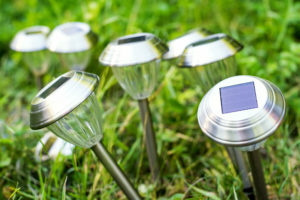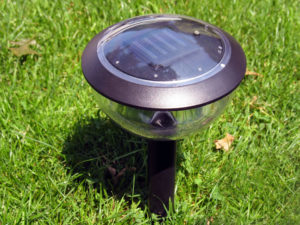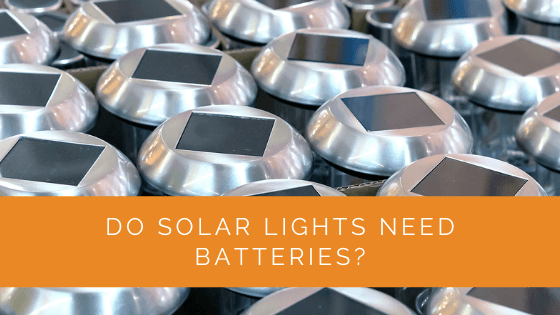Many people are interested in solar lights, but they often wonder if you need batteries. There is a simple answer to this question – Yes, solar lights use energy from the sun to recharge the rechargeable batteries in the light unit. The batteries store the energy until the light is turned on which is generally done by a sensor or timer.
The best part about solar lights is that you can place them almost anywhere. You don’t have to worry about running wires or finding an outlet nearby. Solar lights are also a great way to save money on your electric bill because they use the sun’s natural energy to power the light.
There are many different types of solar lights available, so be sure to do your research and find the best option for your needs. Some popular choices include solar path lights, solar security lights, and solar garden lanterns.
No matter what type of solar light you choose, you can be sure that it will help reduce your carbon footprint while providing safety and convenience for your home or garden.
Contents
- 1 Key Takeaways
- 2 Why Do Solar Lights Need Batteries?
- 3 Are Batteries Provided with Solar Lights?
- 4 How Long Does It Take to Charge Solar Lights?
- 5 How Long Do Solar Lights Last?
- 6 What Types of Batteries Are in Solar Lights?
- 7 NiMH Versus NiCd Rechargeable Batteries
- 8 How Do I Know If the Batteries Need Replacing?
- 9 How Can You Extend The Lifespan Of Rechargeable Batteries?
- 10 How Do Solar Lights Work?
- 11 How Do You Charge Brand New Solar Lights?
- 12 What Are the Benefits of Solar Lights?
- 13 Case Study: Maximizing the Efficiency of Solar Light Batteries
- 14 Expert Insights From Our Solar Panel Installers About Solar Lights Needing Batteries
- 15 Our Expertise in Solar Lights
- 16 Conclusion
Key Takeaways
- Solar lights use energy from the sun to recharge their batteries, which store energy until the light is turned on, offering a cost-effective and eco-friendly lighting solution.
- Whether solar lights come with batteries or not depends on the specific product, so it’s essential to check product information before purchasing.
- The lifespan of solar light batteries can be extended by avoiding overcharging, extreme temperatures, and proper storage, making them a sustainable lighting option.
Why Do Solar Lights Need Batteries?
The reason that solar lights require batteries is that they store the energy from the sun. As we’ve mentioned, you don’t need to replace or recharge these batteries for your light to work properly and continue providing you with light when it gets dark.
Are Batteries Provided with Solar Lights?
This answer depends on the light. Many solar lights do come with batteries, while others don’t. It’s always best to check the product information before you make your purchase so that you know what to expect.
If you’re looking for a set of solar garden lights and want them to include rechargeable batteries, it might be helpful to look for products that specifically state this in their title or description. For example, if you searched for “solar garden lights with batteries,” a list of results would appear that contained all products containing those keywords.

How Long Does It Take to Charge Solar Lights?
This is a very common question, and the answer varies from light to light. It also depends on how much sunlight your specific solar lights get throughout the day.
Solar garden lights that use batteries should be fully charged after about eight hours of exposure to direct sun over a period of one to two days for them to last all night long.
How Long Do Solar Lights Last?
Solar garden lights can last anywhere from four to six hours when they are fully charged. This will vary depending on the type of light and how much sunlight it gets throughout the day, but you should get a good idea of what to expect by looking at product information before making your purchase.
What Types of Batteries Are in Solar Lights?
Solar lights that are equipped with rechargeable batteries will generally use either nickel-cadium (ni-cd) or lithium-ion. Of these two types, ni-cd is cheaper and easier to find, but they have a lower energy density which means they don’t last as long between charges. Lithium-ion has more power capacity so it can potentially go longer without needing recharging.
NiMH Versus NiCd Rechargeable Batteries
Nickel-metal-hydride (NiMH) batteries are often used in solar lights because they offer a longer lifespan than nickel-cadmium (NiCd) batteries. In fact, NiMH batteries can be reused up to 1000 times, whereas NiCd batteries only last for about 100 charge cycles. So if you’re looking for a more sustainable option, NiMH might be the better choice for you.
How Do I Know If the Batteries Need Replacing?
If your solar lights aren’t staying on as long as they used to, this could mean that the batteries need replacing. If you’ve had them for a few months and it’s not wintertime (when there isn’t much sunlight) then it might be time to replace your rechargeable batteries.
Another way is by examining how often you’re recharging them – if these replacements don’t last very long at all, then chances are good that the battery needs replacing.
Replacing the batteries in solar lights is a simple process that just requires unscrewing the light unit and taking out the old battery. Then, you can put in a new one – make sure it’s fully charged before you do this! – and screw the light unit back on. You’re good to go!
How Can You Extend The Lifespan Of Rechargeable Batteries?
Rechargeable batteries in solar lights can last a long time with proper care. Here are some tips on how to extend the lifespan of your rechargeable batteries:
- Don’t overcharge them – this can reduce the overall life of the battery
- Avoid extreme temperatures (both high and low) as this can also affect battery life
- Store them in a cool, dry place – this will help prevent corrosion
- If you’re not going to be using them for an extended period, it’s best to remove the batteries from the solar light altogether
These are just a few suggestions on how to get the most out of your rechargeable batteries in solar lights. For more information, consult your product’s instruction manual. By following these tips, you can ensure that your batteries will last as long as possible and that you’ll be able to enjoy your solar lights for years to come!

How Do Solar Lights Work?
Solar lights work by converting the sun’s energy into electricity. This happens when daylight hits the solar panel on the light, which then charges the battery in the light unit. When it gets dark and the sensor or timer turns on the light, this stored energy is used to power the LED bulbs.
This entire process is completely automatic – you don’t have to do anything extra to make your solar light work! All you need is direct sunlight and they’ll take care of the rest.
How Do You Charge Brand New Solar Lights?
If you’ve just purchased a new solar light, then it will need to be charged before use. You can do this by placing the light in direct sunlight for about eight hours – if possible, place it somewhere that gets six or more hours of full sun each day.
This is important because even brand new lights won’t have much-stored power and so they’ll only work when fully charged. If your lights aren’t getting any charge at all (it’s not sunny where you live), then try charging them indoors near a window with southern exposure as this provides consistent and strong sunlight throughout most of the year.
What Are the Benefits of Solar Lights?
There are many benefits to using solar lights, the biggest of which is that they’re powered by the sun. This means they don’t need any extra cords or plugs, and they’ll work as long as there’s daylight.
Solar lights are also a great way to save money on your energy bill since you’re not using electricity from the grid to power them. They’re environmentally friendly too since they don’t produce any emissions from burning fossil fuels as traditional lighting does.
Finally, solar lights add a touch of elegance and sophistication to any outdoor space – perfect for anyone who wants to enhance their home’s curb appeal!
Case Study: Maximizing the Efficiency of Solar Light Batteries
Background
At Solar Panels Network USA, we strive to help our customers make informed decisions about their solar lighting needs. One common query we encounter is whether solar lights require batteries and how to ensure their longevity and performance. This case study demonstrates our approach to educating and assisting customers in understanding the importance of rechargeable batteries in solar lights.
Project Overview
A client approached us with concerns about their solar garden lights not staying on for long periods at night. They were unsure if the issue was related to the type of batteries used or if the lights themselves were malfunctioning. Our goal was to identify the problem and provide a sustainable solution.
Implementation
Initial Assessment
We began by inspecting the solar garden lights and discovered that the client had been using regular alkaline batteries. Alkaline batteries are not designed for the charging cycles required by solar lights, leading to poor performance and potential damage.
Educating the Client
We explained the necessity of using rechargeable batteries, such as Nickel-Cadmium (NiCd) or Nickel-Metal Hydride (NiMH), which are specifically designed for solar lights. These batteries can handle frequent charging and discharging cycles, ensuring optimal performance.
Replacement and Testing
We replaced the alkaline batteries with high-quality NiMH batteries, known for their longevity and efficiency. The steps included:
- Removing Alkaline Batteries Carefully removing the non-rechargeable batteries to prevent any potential damage to the light fixtures.
- Installing NiMH Batteries Installing the new NiMH batteries, ensuring proper alignment and secure placement.
- Testing Functionality Testing the solar lights to confirm they were charging efficiently during the day and providing consistent illumination at night.
Maintenance Tips
We provided the client with guidelines for maintaining their solar light batteries:
- Avoid Overcharging: Ensuring the lights are not exposed to direct sunlight for extended periods beyond their charging capacity.
- Proper Storage: Storing spare batteries in a cool, dry place to prevent degradation.
- Regular Checks: Monitoring battery performance and replacing them every two years or when a noticeable decline in performance occurs.
Results
The replacement of alkaline batteries with NiMH batteries resulted in a significant improvement in the performance of the solar garden lights. The lights now provided consistent and reliable illumination throughout the night, much to the client’s satisfaction. This solution not only resolved the immediate issue but also ensured long-term sustainability and efficiency.
Summary
This case study highlights the importance of using the appropriate rechargeable batteries in solar lights to ensure their optimal performance and longevity. By educating our clients and providing practical solutions, Solar Panels Network USA helps homeowners maintain efficient and sustainable solar lighting systems. Proper battery care and maintenance are crucial for maximizing the benefits of solar lights, ensuring they remain a cost-effective and eco-friendly lighting option for years to come.
Expert Insights From Our Solar Panel Installers About Solar Lights Needing Batteries
Solar lights rely on rechargeable batteries to store the energy captured from the sun during the day. These batteries are essential for the lights to function efficiently at night.
Senior Solar Technician
Using the right type of rechargeable batteries, like NiCd or NiMH, ensures your solar lights will provide consistent and reliable illumination while minimizing maintenance.
Lead Solar Installer
Proper care and storage of solar light batteries can significantly extend their lifespan, allowing you to enjoy the benefits of solar lighting for many years without frequent replacements.
Solar Installation Specialist
Our Expertise in Solar Lights
At Solar Panels Network USA, we’re here to provide you with valuable information and support regarding solar lighting. With our experience and understanding of the solar lighting industry, our team of experts is prepared to assist you in finding the right lighting solution for your needs. Whether you’re interested in improving your outdoor spaces, conserving energy, or adopting a more sustainable approach, we’re well-equipped to help. Please feel free to contact us with any questions or inquiries.
Conclusion
Solar garden lights are a great way to add some extra light to your outdoor spaces without having to use electricity. You must get the right type of solar light for your needs, and it’s also good to know how long each one will last before making a purchase.
While standard solar lights don’t need batteries, others do – make sure you check product descriptions or consult customer reviews before buying any!
About the Author
Solar Panels Network USA stands at the forefront of solar energy solutions, driven by a team of seasoned solar engineers and energy consultants. With over decades of experience in delivering high-quality solar installations and maintenance, we are committed to promoting sustainable energy through customer-centric, tailored solutions. Our articles reflect this commitment, crafted collaboratively by experts to provide accurate, up-to-date insights into solar technology, ensuring our readers are well-informed and empowered in their solar energy decisions.

